外研版英语七年级上册 Module 5 My school day Unit 2 We start work at nineo'clock课件(共41张PPT,内嵌音频)
文档属性
| 名称 | 外研版英语七年级上册 Module 5 My school day Unit 2 We start work at nineo'clock课件(共41张PPT,内嵌音频) | 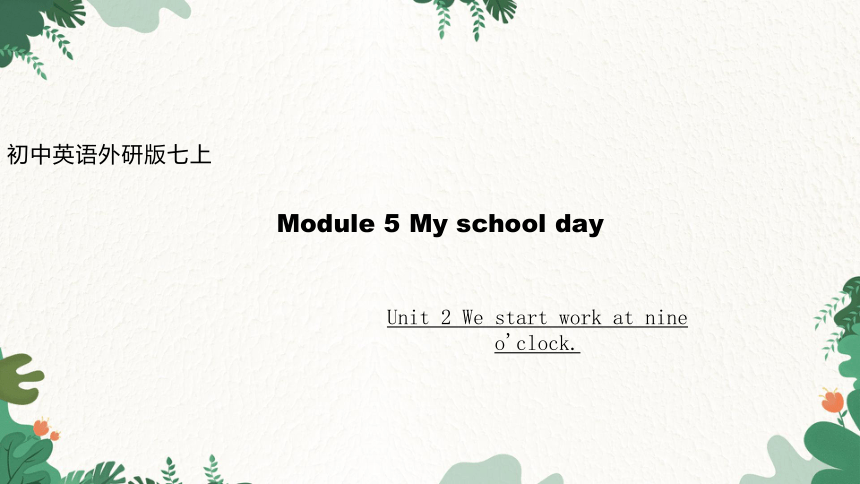 | |
| 格式 | pptx | ||
| 文件大小 | 5.9MB | ||
| 资源类型 | 教案 | ||
| 版本资源 | 外研版 | ||
| 科目 | 英语 | ||
| 更新时间 | 2023-06-25 16:50:25 | ||
图片预览

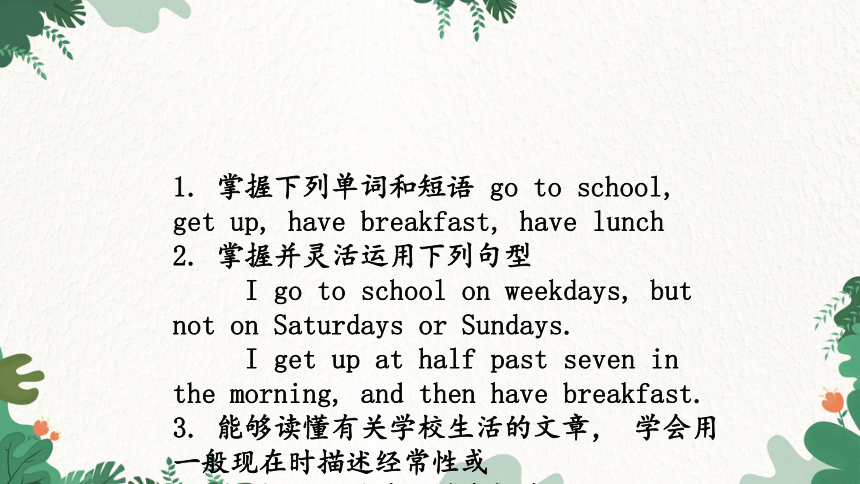
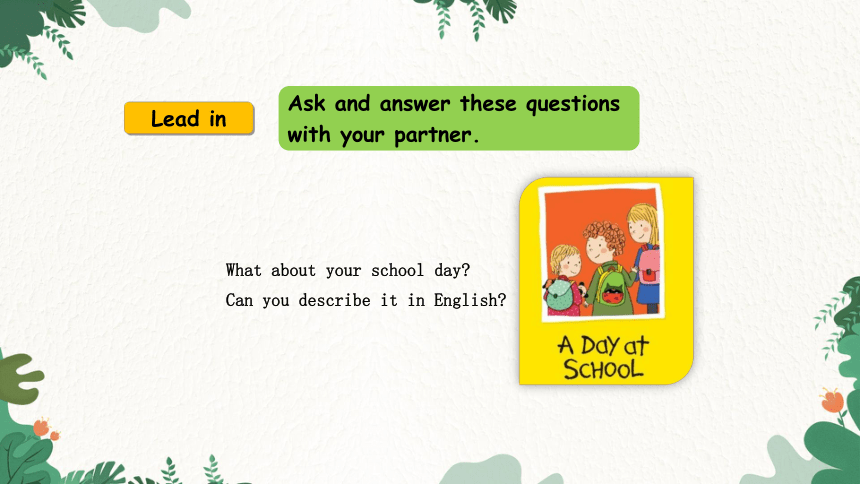

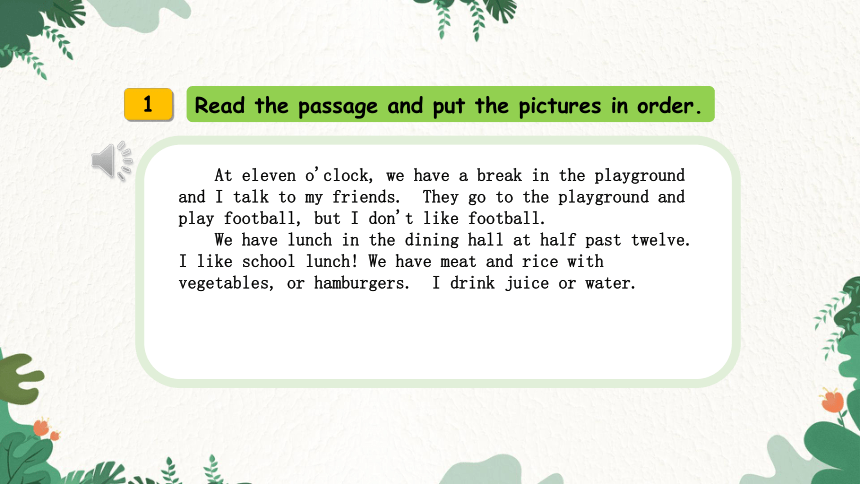
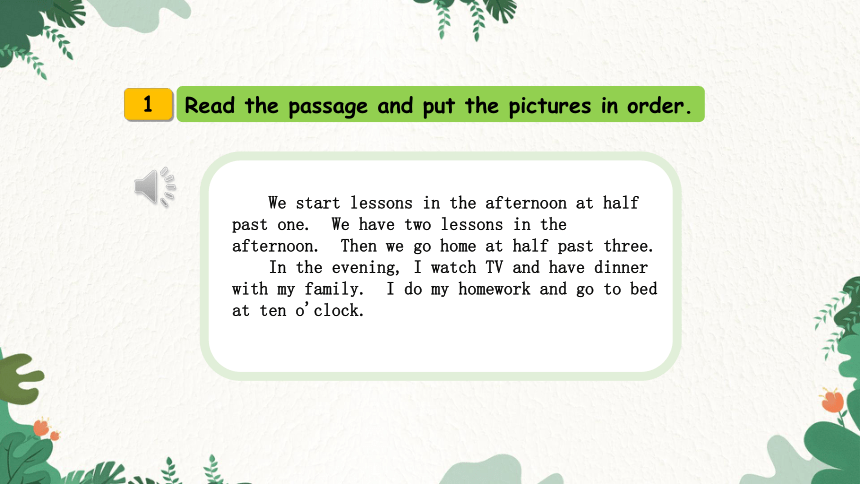
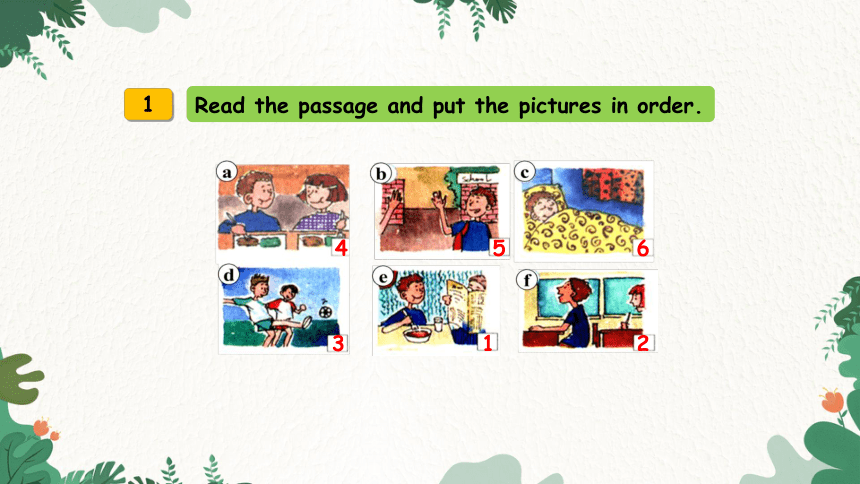
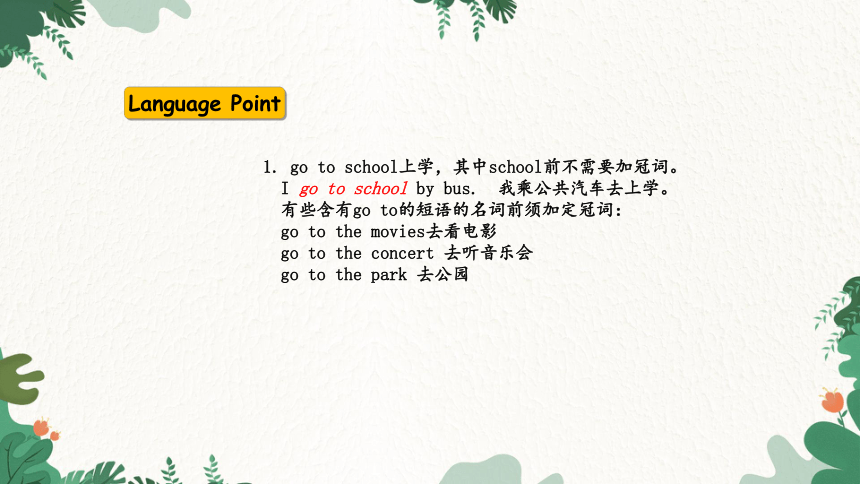
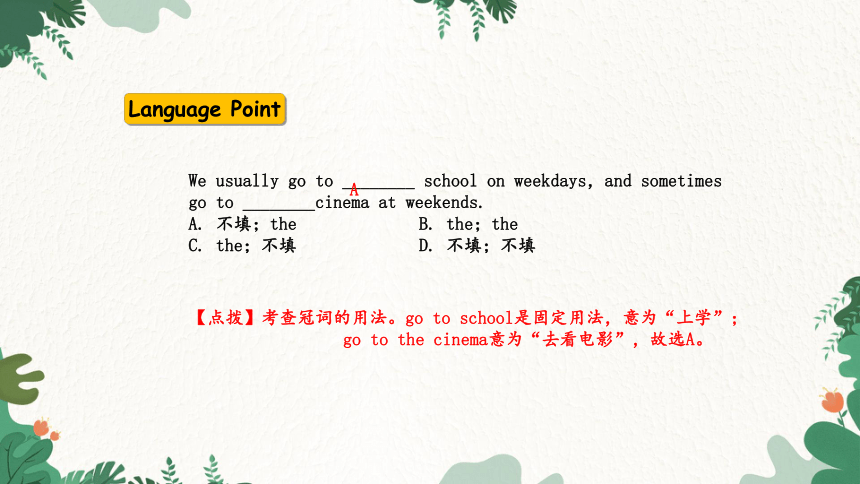
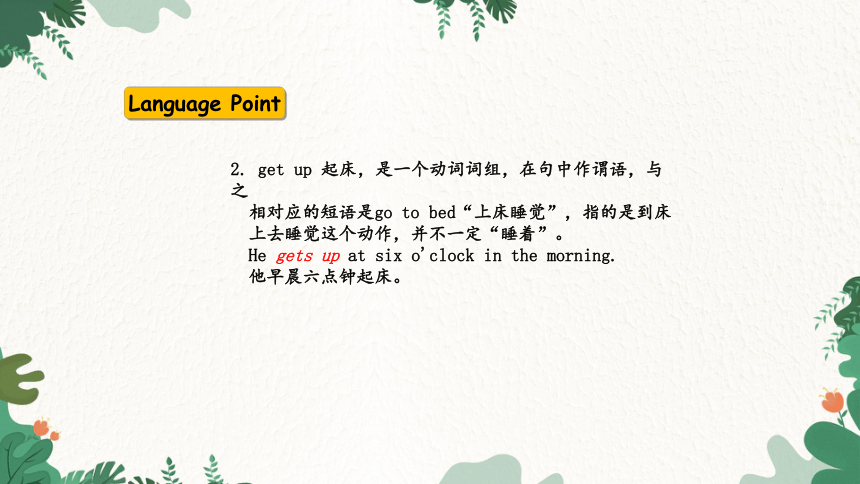

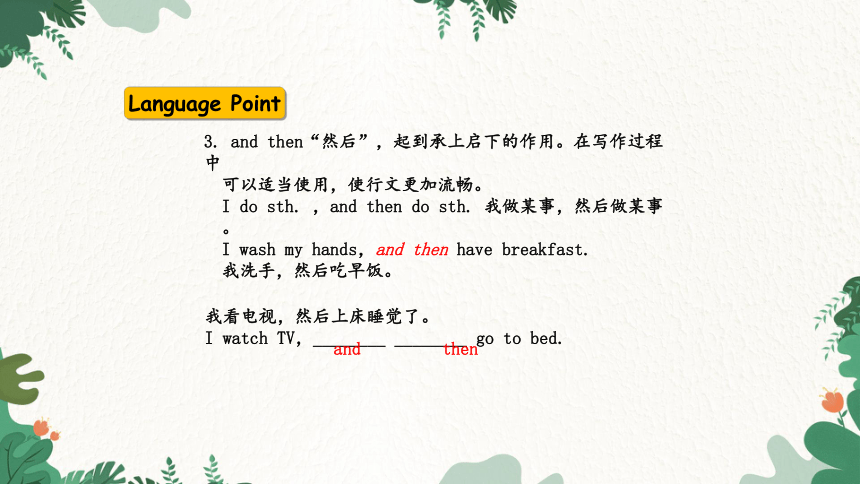
文档简介
(共41张PPT)
Module 5 My school day
初中英语外研版七上
Unit 2 We start work at nine o'clock.
1. 掌握下列单词和短语 go to school, get up, have breakfast, have lunch
2. 掌握并灵活运用下列句型
I go to school on weekdays, but not on Saturdays or Sundays.
I get up at half past seven in the morning, and then have breakfast.
3. 能够读懂有关学校生活的文章, 学会用一般现在时描述经常性或
习惯性的动作,并掌握连词 and then 的用法。
Lead in
Ask and answer these questions
with your partner.
What about your school day
Can you describe it in English
1
Read the passage and put the pictures in order.
My school day
Hi! I'm Alex Greenall. I'm thirteen and I go to Park School in Oxford, England. I go to school on weekdays, but not on Saturday and Sunday. This is my school day. I get up at half past seven in the morning, and then have breakfast.
My school is next to my house. I go to school at half past eight and see my friends. We start work at nine o'clock. We have three lessons in the morning. My favourite subject is art.
1
Read the passage and put the pictures in order.
At eleven o'clock, we have a break in the playground and I talk to my friends. They go to the playground and play football, but I don't like football.
We have lunch in the dining hall at half past twelve. I like school lunch! We have meat and rice with vegetables, or hamburgers. I drink juice or water.
1
Read the passage and put the pictures in order.
We start lessons in the afternoon at half past one. We have two lessons in the afternoon. Then we go home at half past three.
In the evening, I watch TV and have dinner with my family. I do my homework and go to bed at ten o'clock.
1
Read the passage and put the pictures in order.
4
5
3
1
2
6
Language Point
1. go to school上学,其中school前不需要加冠词。
I go to school by bus. 我乘公共汽车去上学。
有些含有go to的短语的名词前须加定冠词:
go to the movies去看电影
go to the concert 去听音乐会
go to the park 去公园
Language Point
We usually go to ________ school on weekdays,and sometimes go to ________cinema at weekends.
A. 不填;the B. the;the
C. the;不填 D. 不填;不填
A
【点拨】考查冠词的用法。go to school是固定用法,意为“上学”;
go to the cinema意为“去看电影”,故选A。
Language Point
2. get up 起床,是一个动词词组,在句中作谓语,与之
相对应的短语是go to bed“上床睡觉”,指的是到床上去睡觉这个动作,并不一定“睡着”。
He gets up at six o'clock in the morning.
他早晨六点钟起床。
Language Point
get up还有“站起;起来”之意。
The class got up when the teacher came in.
老师进来时全班起立。
It's good for our health to g_____ up early in the morning.
et
Language Point
3. and then“然后”,起到承上启下的作用。在写作过程中
可以适当使用,使行文更加流畅。
I do sth. ,and then do sth. 我做某事,然后做某事。
I wash my hands,and then have breakfast.
我洗手,然后吃早饭。
我看电视,然后上床睡觉了。
I watch TV,________ ________ go to bed.
and then
Language Point
4. 【辨析】have和eat
have 及物动词,后面必须带宾语,常用于breakfast,lunch,supper前。
eat 既可作及物动词也可作不及物动词,可以接各种吃的东西。
Language Point
have被称为“万能小词”,用法广泛,常见用法有:
have lessons上课 ;have a good time玩得高兴;have a break休息;
have a look看一看;have a try试一下;have a swim游泳;
have a cold感冒;have a meeting开会。
写出画线单词的汉语意思:
(1) They have breakfast at home. __________
(2) The students have a break at half past ten. __________
(3) I have a new computer. __________
吃
进行(活动)
拥有
Language Point
5. 【辨析】family,house和home
family 家,家庭 由父母、子女所组成的家庭,它与家庭的组成成员有关,而一般不涉及房屋。
house 家,住宅 一家人所住的房屋,强调建筑物本身。
home 家 同家人共同生活的地方,不涉及家庭中的组成成员,也不一定含有建筑物的意思,特别强调家里的氛围和环境,home还作副词,意为“在家;到家”。
My home is in Beijing. I have a big family. Our house is very beautiful.
我家在北京,我有一个大家庭,我们的房子非常漂亮。
Language Point
Hangzhou is ________ to hundreds of foreign friends who are working and studying here.
A. home B. house C. family D. room
A
【点拨】此题考查名词词义辨析。home“家”,带有感彩;
house强调建筑物;family强调“家庭”;room指“房
间”。句意为“杭州是成百上千的外国朋友的家,他们
正在这里工作和学习。”故选A。
Language Point
6. start v. 开始。可作及物动词,其后直接跟名词、
代词作宾语,或用于结构:start to do/doing sth. 意为“开始做某事”。start也可作不及物动词。其同义词是begin。
We start school next week. 我们下星期开学。
Language Point
【拓展】
(1) start作动词,还有“创办,开办;开动,发动;出发,动身”之意。
He wants to start a newspaper. 他想创办报纸。
(2) start可以用作名词,表示“开始,开端”。
We will miss the start of the game.
我们将错过比赛的开始。
Lessons s_______ at eight o'clock.
tart
Language Point
7. break n. (课间)休息,表示在活动中间打断一下,稍停一停。
比如工作间的休息、课间休息,表示过后接着工作或上课。在美国等西方国家,在办公室工作的人们常常在上午或者下午工作中间停下来休息一小段时间。人们可以在这段时间喝一杯茶或者是咖啡,所以称为tea break,也可以叫coffee break。
rest意思是“休息”,比break的时间稍长。
Let's have a rest. 咱们休息一下吧。
Language Point
have a break意为“休息一会儿”。have+a+名词=take a+名词,
表示进行与该名词相关的事情或活动。
Let's go and have a drink. 咱们去喝一杯吧。
我们上午有休息时间吗?
Do we ________ ________ ________ in the morning
have a break
break还可作动词,表示“违反 (规则);破坏(约束)”,另外还常表示“中断,打断;打破 (纪录)”等。
Don't break school rules. 不要违反校规。
Language Point
8. with介词,有多种用法:
① 具有;带有
China is a country with a long history.
中国是一个历史悠久的国家。
The girl with long hair is my sister.
那个留长发的女孩是我妹妹。
Language Point
② 用;使用 (工具、手段等)
He writes with a pencil. 他用铅笔写字。
③ 同;跟
Robert plays with his friend.
罗伯特跟他的朋友一起玩。
This is our new school ________ big classrooms
and libraries.
A. in B. of C. for D. with
D
Language Point
9. go home回家,是动词短语,home前不加介词,因为此处的
home为副词,意为“到家;在家”。
Let's go home. 咱们回家吧。
表示“去某人的家”则要用go to sb. 's home,此时home为
名词,意为“家”。
我们下午四点钟回家。
We ________ ________ at four o'clock in the afternoon.
go home
Language Point
10. 【辨析】watch,look,see和 read
watch 常指看电视、电影、比赛等 I often watch football matches on TV. 我经常在电视上看足球赛。
look 强调“看”的动作 They looked,but they saw nothing. 他们看了,但什么也没看见。
see 侧重于“看”的结果
read 指读书、看报、看杂志等 His father likes reading the newspaper. 他父亲喜欢看报。
Language Point
He likes basketball very much. So he often ________ the basketball match.
A. watches B. see C. looks D. looks at
A
【点拨】四个选项都有“看”的意思。see表示“看见”,强调
结果;look强调看的动作;look at后加看的对象,也
强调动作;watch用于观看电视、比赛等。故选A。
Practice
Work in pairs.
S1: What time do you get up
S2: I get up at 6:30. How about you
S1: I get up at 7 o’clock.
S2: …
2
Match the times with the pictures in Activity 1.
7:30 am 10:00 pm
11:00 am 12:30 pm
3:30 pm 9:00 am
e
c
d
a
b
f
3
Underline the correct expressions.
1 I get up/start work at half past seven.
2 We have a break/have lunch at half past twelve.
3 I go home/watch TV in the evening.
4 I do my homework/see my friends in the evening.
5 I go home/go to sleep at ten o'clock.
Language Point
11. sleep n. 睡觉 v. 睡觉
【辨析】go to bed,sleep和 go to sleep
go to bed “上床睡觉”,指去睡觉的动作。 He goes to bed early at night.
晚上他早早上床睡觉。
sleep 既可作动词,也可作名词。表示“睡眠”的持续状态。 You should sleep at least eight hours. 你应当至少睡8个小时。
Language Point
go to sleep 入睡,睡着 Go to sleep and stop worrying about it.
快睡吧,别再为此担心了。
他早早就上床睡觉,但却无法睡着。
He ________ ________ ________ early,but he
can't ________ ________ ________.
goes to bed
go to sleep
4
Write about yourself. Write about yourself. Use the expressions in Activity 3 to help you.
I get up at …
5
Work in pairs. Talk about your school day.
I get up at half past seven.
We start work at nine o'clock.
We have lunch at half past twelve.
6
Look at the sentences.
I get up at seven o'clock. I go to school at eight o'clock.
I get up at seven o'clock,and then go to school at eight o'clock.
Now join the sentences with and then.
1 In the morning, we get up. We go to school.
In the morning, we get up and then we go to school.
6
Look at the sentences.
2 In the afternoon,we have lessons. We play football in the playground.
In the afternoon, we have lessons and then we play football in the
playground.
3 In the evening,I have dinner. I do my homework.
In the evening, I have dinner and then I do my homework.
4 In the evening,I do my homework. I go to bed.
In the evening, I do my homework and then I go to bed.
课堂小结
重点单词: go to school, get up, have breakfast, have lunch, go home, evening, have, dinner, do homework, go to bed,
go to sleep
重点句式: I get up at…/…, but I don’t like football;学会写一篇自己的“学校一日”。
Exercise
单项选择
1. They ________ have any lessons on Saturdays.
A. aren't B. don't C. doesn't D. not
2. They usually ________ a walk after supper.
A. take B. takes C. is taking D. will take
B
【点拨】have为行为动词,且主语不是第三人称单数形式,故
改为否定句时要借助于助动词don't。
A
【点拨】根据usually可知用一般现在时,故选A。
Exercise
单项选择
3. My parents often ________ me some gifts on my birthday.
A. buy B. will buy C. buys D. has bought
4. —________ you do your homework in the evening
—Of course.
A. Does B. Are C. Do D. /
5. —What do you often do at weekends
—I often ________ my grandparents.
A. visit B. visited C. have visited D. will visit
A
C
A
Exercise
句型转换
1. They often go to work at weekdays. (改为一般疑问句)
________ ________ often ________ to work at weekdays
2. We do our homework in the evening. (改为否定句)
We ________ ________ our homework in the evening.
3. We have lunch at 12:00. (对画线部分提问)
________ ________ ________ you ________ lunch
4. We have some apples on the desk. (改为否定句)
We ________ ________ ________ apples on the desk.
5. I like Chinese and English. (改为否定句)
I ________ ________ Chinese ________ English.
Do they go
don't do
What time do have
don't have any
don't like or
1. 熟记本课时的词汇
2. 完成本课时的课后作业
Homework
Books and friends should be few but good. 读书如交友,应求少而精。
By reading we enrich the mind, and by conversation we polish it.
读书使人充实,交谈使人精明。
Complacency is the enemy of study. 学习的敌人是自己的满足。
Knowledge is power. 知识就是力量。
Remember
Thanks for listening!
Module 5 My school day
初中英语外研版七上
Unit 2 We start work at nine o'clock.
1. 掌握下列单词和短语 go to school, get up, have breakfast, have lunch
2. 掌握并灵活运用下列句型
I go to school on weekdays, but not on Saturdays or Sundays.
I get up at half past seven in the morning, and then have breakfast.
3. 能够读懂有关学校生活的文章, 学会用一般现在时描述经常性或
习惯性的动作,并掌握连词 and then 的用法。
Lead in
Ask and answer these questions
with your partner.
What about your school day
Can you describe it in English
1
Read the passage and put the pictures in order.
My school day
Hi! I'm Alex Greenall. I'm thirteen and I go to Park School in Oxford, England. I go to school on weekdays, but not on Saturday and Sunday. This is my school day. I get up at half past seven in the morning, and then have breakfast.
My school is next to my house. I go to school at half past eight and see my friends. We start work at nine o'clock. We have three lessons in the morning. My favourite subject is art.
1
Read the passage and put the pictures in order.
At eleven o'clock, we have a break in the playground and I talk to my friends. They go to the playground and play football, but I don't like football.
We have lunch in the dining hall at half past twelve. I like school lunch! We have meat and rice with vegetables, or hamburgers. I drink juice or water.
1
Read the passage and put the pictures in order.
We start lessons in the afternoon at half past one. We have two lessons in the afternoon. Then we go home at half past three.
In the evening, I watch TV and have dinner with my family. I do my homework and go to bed at ten o'clock.
1
Read the passage and put the pictures in order.
4
5
3
1
2
6
Language Point
1. go to school上学,其中school前不需要加冠词。
I go to school by bus. 我乘公共汽车去上学。
有些含有go to的短语的名词前须加定冠词:
go to the movies去看电影
go to the concert 去听音乐会
go to the park 去公园
Language Point
We usually go to ________ school on weekdays,and sometimes go to ________cinema at weekends.
A. 不填;the B. the;the
C. the;不填 D. 不填;不填
A
【点拨】考查冠词的用法。go to school是固定用法,意为“上学”;
go to the cinema意为“去看电影”,故选A。
Language Point
2. get up 起床,是一个动词词组,在句中作谓语,与之
相对应的短语是go to bed“上床睡觉”,指的是到床上去睡觉这个动作,并不一定“睡着”。
He gets up at six o'clock in the morning.
他早晨六点钟起床。
Language Point
get up还有“站起;起来”之意。
The class got up when the teacher came in.
老师进来时全班起立。
It's good for our health to g_____ up early in the morning.
et
Language Point
3. and then“然后”,起到承上启下的作用。在写作过程中
可以适当使用,使行文更加流畅。
I do sth. ,and then do sth. 我做某事,然后做某事。
I wash my hands,and then have breakfast.
我洗手,然后吃早饭。
我看电视,然后上床睡觉了。
I watch TV,________ ________ go to bed.
and then
Language Point
4. 【辨析】have和eat
have 及物动词,后面必须带宾语,常用于breakfast,lunch,supper前。
eat 既可作及物动词也可作不及物动词,可以接各种吃的东西。
Language Point
have被称为“万能小词”,用法广泛,常见用法有:
have lessons上课 ;have a good time玩得高兴;have a break休息;
have a look看一看;have a try试一下;have a swim游泳;
have a cold感冒;have a meeting开会。
写出画线单词的汉语意思:
(1) They have breakfast at home. __________
(2) The students have a break at half past ten. __________
(3) I have a new computer. __________
吃
进行(活动)
拥有
Language Point
5. 【辨析】family,house和home
family 家,家庭 由父母、子女所组成的家庭,它与家庭的组成成员有关,而一般不涉及房屋。
house 家,住宅 一家人所住的房屋,强调建筑物本身。
home 家 同家人共同生活的地方,不涉及家庭中的组成成员,也不一定含有建筑物的意思,特别强调家里的氛围和环境,home还作副词,意为“在家;到家”。
My home is in Beijing. I have a big family. Our house is very beautiful.
我家在北京,我有一个大家庭,我们的房子非常漂亮。
Language Point
Hangzhou is ________ to hundreds of foreign friends who are working and studying here.
A. home B. house C. family D. room
A
【点拨】此题考查名词词义辨析。home“家”,带有感彩;
house强调建筑物;family强调“家庭”;room指“房
间”。句意为“杭州是成百上千的外国朋友的家,他们
正在这里工作和学习。”故选A。
Language Point
6. start v. 开始。可作及物动词,其后直接跟名词、
代词作宾语,或用于结构:start to do/doing sth. 意为“开始做某事”。start也可作不及物动词。其同义词是begin。
We start school next week. 我们下星期开学。
Language Point
【拓展】
(1) start作动词,还有“创办,开办;开动,发动;出发,动身”之意。
He wants to start a newspaper. 他想创办报纸。
(2) start可以用作名词,表示“开始,开端”。
We will miss the start of the game.
我们将错过比赛的开始。
Lessons s_______ at eight o'clock.
tart
Language Point
7. break n. (课间)休息,表示在活动中间打断一下,稍停一停。
比如工作间的休息、课间休息,表示过后接着工作或上课。在美国等西方国家,在办公室工作的人们常常在上午或者下午工作中间停下来休息一小段时间。人们可以在这段时间喝一杯茶或者是咖啡,所以称为tea break,也可以叫coffee break。
rest意思是“休息”,比break的时间稍长。
Let's have a rest. 咱们休息一下吧。
Language Point
have a break意为“休息一会儿”。have+a+名词=take a+名词,
表示进行与该名词相关的事情或活动。
Let's go and have a drink. 咱们去喝一杯吧。
我们上午有休息时间吗?
Do we ________ ________ ________ in the morning
have a break
break还可作动词,表示“违反 (规则);破坏(约束)”,另外还常表示“中断,打断;打破 (纪录)”等。
Don't break school rules. 不要违反校规。
Language Point
8. with介词,有多种用法:
① 具有;带有
China is a country with a long history.
中国是一个历史悠久的国家。
The girl with long hair is my sister.
那个留长发的女孩是我妹妹。
Language Point
② 用;使用 (工具、手段等)
He writes with a pencil. 他用铅笔写字。
③ 同;跟
Robert plays with his friend.
罗伯特跟他的朋友一起玩。
This is our new school ________ big classrooms
and libraries.
A. in B. of C. for D. with
D
Language Point
9. go home回家,是动词短语,home前不加介词,因为此处的
home为副词,意为“到家;在家”。
Let's go home. 咱们回家吧。
表示“去某人的家”则要用go to sb. 's home,此时home为
名词,意为“家”。
我们下午四点钟回家。
We ________ ________ at four o'clock in the afternoon.
go home
Language Point
10. 【辨析】watch,look,see和 read
watch 常指看电视、电影、比赛等 I often watch football matches on TV. 我经常在电视上看足球赛。
look 强调“看”的动作 They looked,but they saw nothing. 他们看了,但什么也没看见。
see 侧重于“看”的结果
read 指读书、看报、看杂志等 His father likes reading the newspaper. 他父亲喜欢看报。
Language Point
He likes basketball very much. So he often ________ the basketball match.
A. watches B. see C. looks D. looks at
A
【点拨】四个选项都有“看”的意思。see表示“看见”,强调
结果;look强调看的动作;look at后加看的对象,也
强调动作;watch用于观看电视、比赛等。故选A。
Practice
Work in pairs.
S1: What time do you get up
S2: I get up at 6:30. How about you
S1: I get up at 7 o’clock.
S2: …
2
Match the times with the pictures in Activity 1.
7:30 am 10:00 pm
11:00 am 12:30 pm
3:30 pm 9:00 am
e
c
d
a
b
f
3
Underline the correct expressions.
1 I get up/start work at half past seven.
2 We have a break/have lunch at half past twelve.
3 I go home/watch TV in the evening.
4 I do my homework/see my friends in the evening.
5 I go home/go to sleep at ten o'clock.
Language Point
11. sleep n. 睡觉 v. 睡觉
【辨析】go to bed,sleep和 go to sleep
go to bed “上床睡觉”,指去睡觉的动作。 He goes to bed early at night.
晚上他早早上床睡觉。
sleep 既可作动词,也可作名词。表示“睡眠”的持续状态。 You should sleep at least eight hours. 你应当至少睡8个小时。
Language Point
go to sleep 入睡,睡着 Go to sleep and stop worrying about it.
快睡吧,别再为此担心了。
他早早就上床睡觉,但却无法睡着。
He ________ ________ ________ early,but he
can't ________ ________ ________.
goes to bed
go to sleep
4
Write about yourself. Write about yourself. Use the expressions in Activity 3 to help you.
I get up at …
5
Work in pairs. Talk about your school day.
I get up at half past seven.
We start work at nine o'clock.
We have lunch at half past twelve.
6
Look at the sentences.
I get up at seven o'clock. I go to school at eight o'clock.
I get up at seven o'clock,and then go to school at eight o'clock.
Now join the sentences with and then.
1 In the morning, we get up. We go to school.
In the morning, we get up and then we go to school.
6
Look at the sentences.
2 In the afternoon,we have lessons. We play football in the playground.
In the afternoon, we have lessons and then we play football in the
playground.
3 In the evening,I have dinner. I do my homework.
In the evening, I have dinner and then I do my homework.
4 In the evening,I do my homework. I go to bed.
In the evening, I do my homework and then I go to bed.
课堂小结
重点单词: go to school, get up, have breakfast, have lunch, go home, evening, have, dinner, do homework, go to bed,
go to sleep
重点句式: I get up at…/…, but I don’t like football;学会写一篇自己的“学校一日”。
Exercise
单项选择
1. They ________ have any lessons on Saturdays.
A. aren't B. don't C. doesn't D. not
2. They usually ________ a walk after supper.
A. take B. takes C. is taking D. will take
B
【点拨】have为行为动词,且主语不是第三人称单数形式,故
改为否定句时要借助于助动词don't。
A
【点拨】根据usually可知用一般现在时,故选A。
Exercise
单项选择
3. My parents often ________ me some gifts on my birthday.
A. buy B. will buy C. buys D. has bought
4. —________ you do your homework in the evening
—Of course.
A. Does B. Are C. Do D. /
5. —What do you often do at weekends
—I often ________ my grandparents.
A. visit B. visited C. have visited D. will visit
A
C
A
Exercise
句型转换
1. They often go to work at weekdays. (改为一般疑问句)
________ ________ often ________ to work at weekdays
2. We do our homework in the evening. (改为否定句)
We ________ ________ our homework in the evening.
3. We have lunch at 12:00. (对画线部分提问)
________ ________ ________ you ________ lunch
4. We have some apples on the desk. (改为否定句)
We ________ ________ ________ apples on the desk.
5. I like Chinese and English. (改为否定句)
I ________ ________ Chinese ________ English.
Do they go
don't do
What time do have
don't have any
don't like or
1. 熟记本课时的词汇
2. 完成本课时的课后作业
Homework
Books and friends should be few but good. 读书如交友,应求少而精。
By reading we enrich the mind, and by conversation we polish it.
读书使人充实,交谈使人精明。
Complacency is the enemy of study. 学习的敌人是自己的满足。
Knowledge is power. 知识就是力量。
Remember
Thanks for listening!
同课章节目录
- Starte
- Module 1 My teacher and my friends
- Module 2 My English lesson
- Module 3 My English book
- Module 4 My everyday life
- Module 1 My classmates
- Unit 1 Nice to meet you.
- Unit 2 I'm Wang Lingling and I'm thirteen years ol
- Unit 3 Language in use.
- Module 2 My family
- Unit 1 Is this your mum?
- Unit 2 These are my parents.
- Unit 3 Language in use.
- Module 3 My school
- Unit 1 There are thirty students in my class.
- Unit 2 The library is on the left of the playgroun
- Unit 3 Language in use.
- Module 4 Healthy food
- Unit 1 We've got lots of apples.
- Unit 2 Is your food and drink healthy?
- Unit 3 Language in use.
- Module 5 My school day
- Unit 1 I love history.
- Unit 2 We start work at nine o'clock.
- Unit 3 Language in use.
- Revision module A
- Module 6 A trip to the zoo
- Unit 1 Does it eat meat?
- Unit 2 The tiger lives in Asia.
- Unit 3 Language in use.
- Module 7 Computers
- Unit 1 How do I write my homework on the computer?
- Unit 2 When do you use a computer?
- Unit 3 Language in use.
- Module 8 Choosing presents
- Unit 1 I always like birthday parties.
- Unit 2 She often goes to concerts.
- Unit 3 Language in use.
- Module 9 People and places
- Unit 1 We're enjoying the school trip a lot.
- Unit 2 They're waiting for buses or trains.
- Unit 3 Language in use.
- Module 10 Spring Festival
- Unit 1 Are you getting ready for Spring Festival?
- Unit 2 My mother's cleaning our houses and sweepin
- Unit 3 Language in use.
- Revision module B
